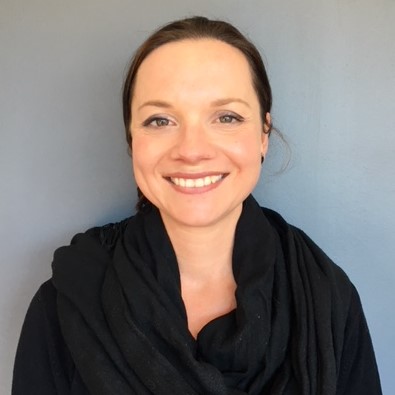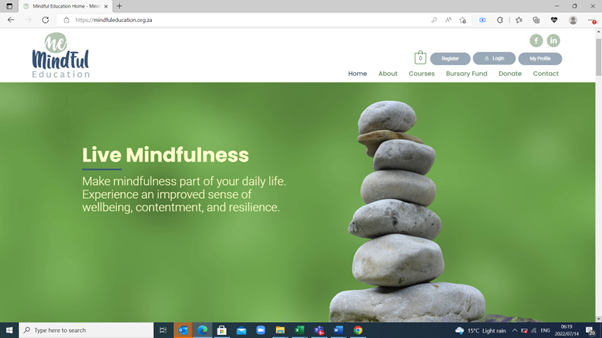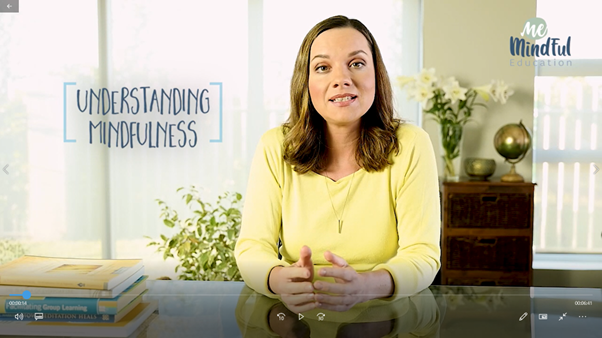Voices from the Sylff Community
Oct 21, 2022
Online Mindfulness Training for South African Teachers: Reflections on a Shared Journey
Liza Hamman, a 2012 Sylff fellow, became a qualified mindfulness facilitator after finding a personal need for mindfulness as a means of ensuring her mental health. With the help of an SLI award, in 2021 Hamman developed an online course on mindfulness for South African teachers, who could then share what they learned with their students. Here she recounts the journey, from her initial encounter with mindfulness to some of the feedback she has received from teachers who have participated in the course.
* * *
When the Sylff Leadership Initiative (SLI) award was granted to me in 2020, it enabled me to put an idea into action—an idea that has been at the back of my mind for many years but I was unable to execute. It was an idea that was formulated based on my own journey with mindfulness, which stared in 2008.
At the time, I was working full-time as a lecturer and studying toward my master’s degree in adult education. It was a particularly challenging period for me, as I constantly felt overwhelmed and exhausted, struggling to cope with my workload and other responsibilities.
I had to find a way to balance work, studies, and my family responsibilities or face burnout. As I started exploring the practice of mindfulness by enrolling in courses and reading extensively on the subject, the benefits and healing qualities of mindfulness were revealed to me. It became apparent to me that to survive the fast pace and demands of modern-day life, I had to integrate a mindfulness practice into my routine—a mindfulness practice to promote mental health, very similar to an exercise regime to ensure physical health.
As I continued my journey with mindfulness, later becoming a qualified mindfulness facilitator, I realized that sharing the practice of mindfulness with others can contribute to relieving some of the suffering in our frantic society. As an educator, and as a mindfulness facilitator, it seemed vital to me that I find innovative ways to introduce as many teachers and their students as possible to the practice. That is when I started formulating the idea of offering a free online mindfulness course for South African teachers. The goal was to introduce them to mindfulness and hopefully initiate their own personal journey with mindfulness. Furthermore, I wanted to empower them to lead their students in simple mindfulness practices in the classroom.
Sharing the Journey with Others Online
In 2021, as a result of receiving the SLI award, I was finally able to offer the first online mindfulness training course developed especially for South African teachers. In the past I had facilitated mindfulness courses for educators in face-to-face settings, and it was always a humbling experience. I was constantly amazed when people shared how the practice influenced their lives for the better or they revealed their own insights during course discussions. It reminded me that a mindfulness practice has the potential to unlock a deep-seated wisdom within all of us. All we needed to do to access this wisdom was engage with ourselves in the present moment, through mindfulness. New knowledge is available to us, if we are willing to simply pay attention to our own experience, whether physically or emotionally, in a kind and mindful manner.
This new knowledge and wisdom were apparent in the feedback from the participants, related below in their own words. Sharon, one of the first participants, remarked on a journey of “healing and self-discovery,” stating that it enabled her to focus on the positive aspects of her life. She said the following about her journey of personal growth:
“Before doing this course, I often felt uncomfortable, like I was being lazy, realizing that I seem to have my own idea of what doing enough is and what being enough is, which isn’t even true. I know that I am doing this course for me, my growth, and to find healing and self-discovery. Perhaps love me more, flaws, disappointments, guilt and all, and thus contribute in a more positive way to people and things around me. Previously, I could not see the value in spending time with myself, but during the course I realized the value of spending time with me. It also opened my eyes to the positive aspects in my life; I could find at least one thing a day that left me feeling good, no matter how small. I discovered that I can be quite judgmental and negative, especially when it comes to me, because I tend to skirt over the positives. Now I focus more on the positive aspects.”
George also related his journey of personal growth and noticed how his ability to listen and connect with others had improved.
“It became very apparent to me that we need to listen more often. We need to take the time to listen to each other, the people we love: children, students, colleagues. So often I am too busy to really listen, to take the time to give my full attention to that person, thinking about tasks that I still need to complete today instead of listening. I often feel the pull of my cell phone. The course reminded me that true wisdom and insight comes when we listen, not when we are the ones speaking. And creating a pause before responding—so often in my life I have been burnt because I am too quick to respond, I go with my first instinct, and this is often not the correct response. Listening, taking time to consider and contemplate, that is what stood out for me.
“The practice of mindfulness forced me into stillness; it forced me to do ‘nothing,’ for a while. At first it seemed very strange to me, almost impossible. And then I convinced my mind that it is not doing nothing, I am still doing something. And that seemed to make it easier to create the moments of stillness and reflection. The calm of these moments supported me throughout my day, and I hope that I will have the discipline to continue including the formal practices in my life.
“The way forward with mindfulness for me means that I would like to continue with the formal practices, and I have invited my wife to join me. Somehow, it is a special time for us, even though we are not speaking to each other, just sitting together—both focusing on our own practice, but it brought a certain connection to each other, a closeness. And in my opinion, we were more in harmony with each other on the days that we did practice together. It is an interesting combination: you are spending time focusing on yourself and working on your own thoughts, yet you are also together. You can feel the presence of the other person.”
Like George, Thandeka and Maposa related the need to share their experience with others. This, as stated previously, was one of the goals of the course. Thandeka, in particular, remarked that she had found a sense of “stillness and peace” that she would like to share with others.
“During the last eight weeks, I have found a sense of peace that I was not able to connect to previously. When I sat down to meditate, I found moments of peace. Not all—of course my mind is still busy, and it drifts and wanders, but one of the greatest gifts for me during the past eight weeks was this sense of stillness and peace. I want to hang on to this. I want to continue experiencing these moments of rest, peace, and stillness, and I would like to share it with others.”
Maposa commented that he learned how precious his health is, that his sleep patterns have improved, and that he finds it easier to manage his anxiety and emotions.
“I have learned how to focus on my health instead of on the pain. This is a huge change from how I used to treat pain. It has made me realize how precious my health is. Through this journey, I have learned about the benefits of meditation, and I am beginning to make it happen for myself, and I do breathing with my students. My sleep has also improved after a session. I have also experienced a reduction in my anxiety and have learned how to manage my emotions better. I am starting to find a way to stay in that rhythm, so that I can keep myself motivated to continue doing it. This is a journey that I will never forget.”
These are just four examples of the type of feedback that I receive after the conclusion of the courses. It is these words, the insights and new knowledge shared by course participants, that motivate me. It underlines that this type of work, although not often prioritized in educational settings, is important and worthwhile. It highlights that if we can allow ourselves to discover our own wisdom, and be willing to share it with others, we have the potential to create meaningful and lasting change.
Final Reflections
As I reflect on my time offering the mindfulness training for South African teachers online, and I read the feedback received from participants, I realize that not everybody had the same experience. For some participants, the experience of mindfulness was more profound than for others. Some participants were willing to commit to the practice and do the hard work, while others wanted a quick fix and was disappointed when they realized that it takes time and effort. For some, just being able to share their experience was already healing, while others remained unwilling to explore too deeply. I accept that some will continue with the journey, while others may decide that the practice of mindfulness is not for them. That is their choice, and I know that each individual must choose the path that is right for them.


